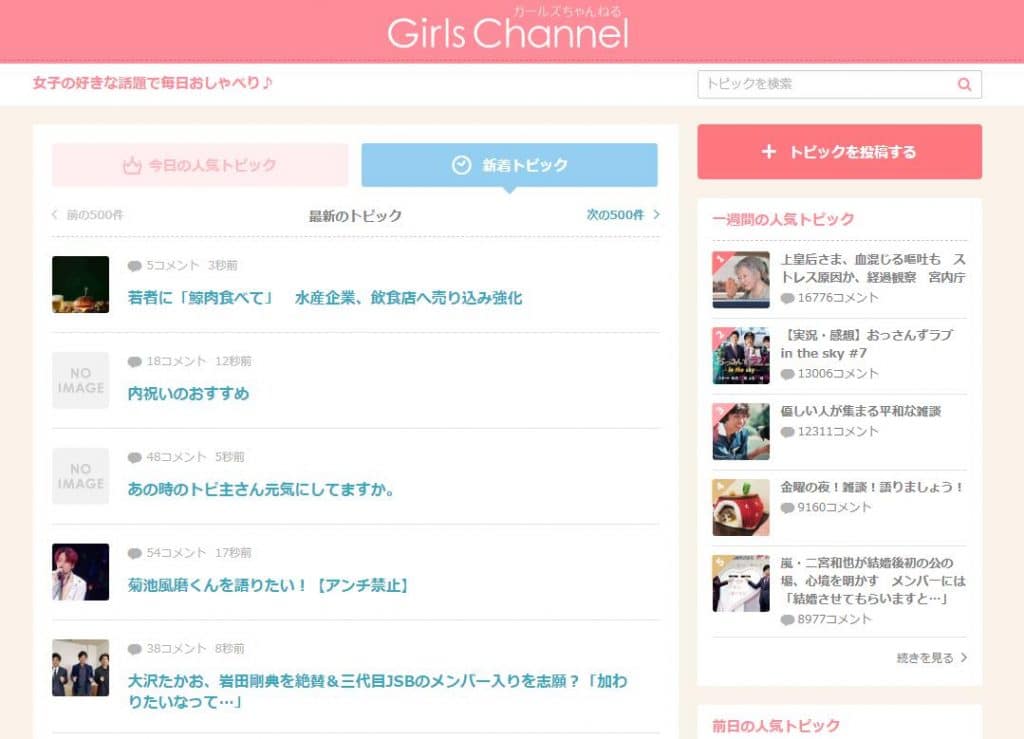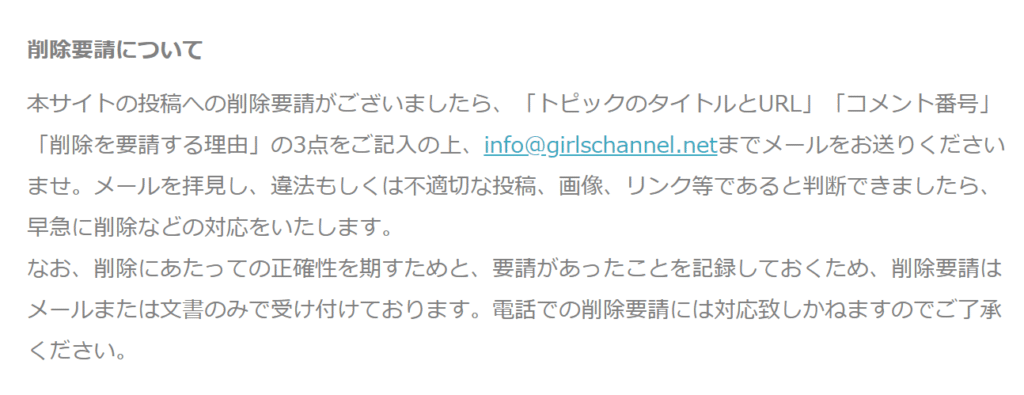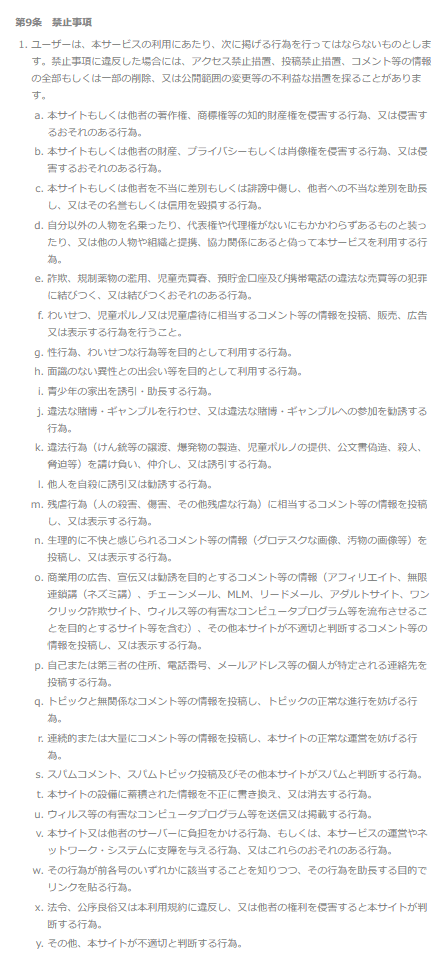How to Delete Posts on 'Japanese Girls Channel (Girls Channel)

Girls Channel (ガールズちゃんねる) is a popular anonymous bulletin board where women can post freely. It is rich in posts about topics that women prefer, such as love, child-rearing, and entertainment news. As a result, Girls Channel often appears at the top of search results for these themes. However, due to its nature as an anonymous bulletin board, it cannot be denied that it can easily become a hotbed for slander and defamation. In this article, we will explain what measures can be taken if you are subjected to defamatory posts on Girls Channel.
Explanation about Girls Channel

Girls Channel is a bulletin board operated by J-Squared Inc., which they describe as a “chat community for women, by women, and of women”. According to the company, it is one of the largest female media in terms of access numbers in Japan. On Girls Channel, short texts and single-sentence comments are frequently posted. In addition, since membership registration is not required to post, the psychological barrier to posting defamatory comments is low. Therefore, like other anonymous bulletin boards such as 5channel (formerly 2channel), there is a tendency for defamatory posts to be easily made.
Another distinctive feature of Girls Channel is the system that allows viewers to press a plus or minus button for each comment. If you agree with a comment, you press the plus button, and if you disagree, you press the minus button, and the number is displayed in the comment. Comments with many pluses are displayed in large letters to stand out, while comments with many minuses are displayed in small letters. Because of this feature, in topics where many viewers agree with the defamation, more extreme comments tend to be rated higher, which can lead to an increase in defamatory comments.
What Kind of Defamation Occurs on Girls Channel?

On Girls Channel, the topic most prone to slander and defamation is undoubtedly entertainment-related. In particular, there is no end to the slander and defamation against celebrities and their associates. The content of the defamation varies, including revealing personal and private information such as real names and addresses of celebrities and their associates, and insulting their appearance. Recently, a case became a topic of discussion where a lot of slander was posted about a woman who is the wife of a male idol group member. Upon the request of the woman’s attorney, the operator took measures to delete all posts related to this woman.
How to Request Removal for Violation of Terms of Use
If defamatory comments are posted on Girls Channel, you can request the operator to remove the comments on the grounds of violation of the site’s terms of use. The specific method for requesting removal is displayed when you click on “Contact Us” at the bottom of the top page.

Send an email to the address listed on the above web page, including:
- The title and URL of the topic
- The comment number
- The reason for requesting removal
Be careful to capture all the comments if the defamation spans multiple comments. Also, the reason for requesting removal is important for the operator to decide whether to remove the comment or not, so it is important to specify which clause of the Girls Channel’s terms of use is being violated.
The terms of use can be displayed by clicking the “Terms of Use” button at the bottom of the top page. The prohibited actions for site use are stipulated in Article 9 of these terms.

If the removal request is accepted by the operator, the comment will be deleted in about a week. Girls Channel is a site that responds to removal requests relatively quickly if they are recognized as violations of the terms of use.
When Your Name or Address is Posted
If personal identification is possible due to postings such as names and addresses, it falls under the “act of posting contact information that identifies an individual, such as a third party’s address, telephone number, email address, etc.” (Article 9, Paragraph 1, Item p. of the Terms of Use) which is prohibited by the terms of use. For example, even if the exact address or room number is not listed and only the city, town, or apartment name is listed, if personal identification is possible, there is a possibility that it falls under the prohibited item p.
When Private Information is Posted
Who you meet in private or your relationships during your student days are things that you generally do not want strangers to know. Therefore, postings about such private facts, whether true or not, can be argued to fall under the “act of infringing on the privacy of others, or act that may infringe” (Article 9, Paragraph 1, Item b. of the Terms of Use) which is prohibited by the terms of use. For more details on the infringement of privacy rights, please refer to the article below.
https://monolith.law/reputation/scope-of-privacyinfringement[ja]
When Content Defaming Appearance, etc. is Posted
Postings that defame someone’s appearance can be considered insulting, and you can argue that they fall under the “act of unfairly discriminating or defaming others” (Article 9, Paragraph 1, Item c. of the Terms of Use) which is prohibited by the terms of use. Not only defamation of appearance, but also comments about the person’s personality, religion, place of origin, nationality, etc., if they unfairly belittle the person, can be argued to fall under the “unfair discrimination or defamation” prohibited above, regardless of whether they are true or not. However, the “act of defaming honor” listed as a prohibited act in Article 9, Paragraph 1, Item c. of the Terms of Use requires the presentation of specific facts that lower a person’s social evaluation. Therefore, abstract postings such as “She’s ugly” or “He has a bad personality” may not necessarily be considered defamation. However, it is believed that the “act of unfairly discriminating or defaming others” (Article 9, Paragraph 1, Item c. of the Terms of Use) can also apply to abstract defamation that does not reach the level of defamation.
Examples of Cases Where Deletion is Requested on the Grounds of Illegality

Defamatory posts can sometimes be considered illegal. The main issue here is defamation. Defamation generally occurs when a fact that lowers a person’s social reputation is posted. However, defamation does not occur if the posted fact is true or if there is a legitimate reason or basis to believe it is true. Even if the fact is true, if the purpose of the post does not serve the public interest or if the fact does not concern the public interest, there is still room for defamation to occur. However, this is rarely disputed, so we will omit it here. For more details on the requirements for defamation, please refer to the article below.
https://monolith.law/reputation/defamation[ja]
On Girls Channel, for example, comments such as “Celebrity A, who was arrested for sexual offenses, has been a habitual offender since his student days” are posted as if they were true. This can generally be considered a specific fact that lowers the person’s social reputation. Therefore, if it is false that he was a habitual offender of sexual crimes during his student days, it constitutes defamation. In such cases where defamation is illegal, not only can you directly request the operator of Girls Channel to delete the post, but you can also request the site administrator or hosting provider to take measures to prevent transmission based on the Japanese Provider Liability Limitation Act. A request to prevent transmission effectively results in deletion. However, the decision to delete is left to the discretion of the site administrator who received the request, so it is important to note that deletion is not guaranteed.
Deletion by Provisional Disposition
All of the methods explained above involve the deletion of posts based on the discretion of the operators of ‘Japanese Girls Channel’. In the unlikely event that the operator does not accept a deletion request, it will be necessary to apply for a deletion through a provisional disposition via the courts. A provisional disposition is a temporary court procedure that differs from a formal court procedure, and a conclusion is usually reached within 1 to 2 months. For more detailed information about provisional dispositions for post deletion, please refer to the article below.
https://monolith.law/reputation/provisional-disposition[ja]
Identifying the Poster through Provisional Disposition
When actual harm has occurred due to defamation or when there is a need to prevent recurrence, it may be necessary to not only delete the post but also to claim damages (compensation) or file criminal charges against the defaming poster. In such cases, it is necessary to identify who the poster is, so a request for disclosure of sender information must be made in conjunction with the deletion of the post. We provide a detailed explanation about the request for disclosure of sender information in the article below.
https://monolith.law/reputation/disclosure-of-the-senders-information[ja]
To request the disclosure of sender information for a post on Girls Channel, you need to obtain the poster’s IP address and timestamp from the operator, and identify the Internet Service Provider used by the poster based on this information. Then, you will receive the disclosure of the poster’s personal information from the Internet Service Provider. However, since the disclosure of sender information involves revealing highly confidential personal information, it is usually only possible to obtain this information through a provisional disposition procedure via the courts, which is different from post deletion. Therefore, if you are making a request for disclosure of sender information at the same time, it would be quicker to use a provisional disposition from the start.
Summary
While Girls Channel offers the advantage of being able to post anonymously and casually, it also has the aspect of being prone to defamatory posts. Given that Girls Channel often appears high in search results, leaving defamatory posts unattended can easily lead to the spread of reputational damage. Therefore, it is necessary to take immediate action when defamatory posts are found on Girls Channel.
In particular, when requesting the deletion of posts through provisional measures or requesting the disclosure of sender information, it becomes a procedure through the court, so it can be difficult to respond without consulting a lawyer. Measures against online defamation and reputational damage require specialized knowledge in IT, so it is important to consult with a lawyer who has extensive experience in this field.
Category: Internet





















